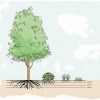 Proper irrigation management is critical to conserve and protect water resources and to properly manage nutrients in the home landscape. How lawns and landscapes are irrigated directly impacts the natural environment, so landscape maintenance professionals and homeowners must adopt environmentally-friendly approaches to irrigation management. After selecting the right plant for the right place, water is the next critical factor to establish and maintain a healthy lawn and landscape. Fertilization is another important component of lawn and landscape maintenance, and irrigation must be applied correctly, especially following fertilization, to minimize potential nutrient losses. This publication supplements other UF/IFAS Extension publications that also include information on the role of soil and the root zone in irrigation management. This publication is designed to help UF/IFAS Extension county agents prepare materials to directly address nutrient losses from lawns and landscapes caused by inadequate irrigation management practices.This 6-page fact sheet was written by George Hochmuth, Laurie Trenholm, Don Rainey, Esen Momol, Claire Lewis, and Brian Niemann, and published by the UF Department of Soil and Water Science, October 2013.
Proper irrigation management is critical to conserve and protect water resources and to properly manage nutrients in the home landscape. How lawns and landscapes are irrigated directly impacts the natural environment, so landscape maintenance professionals and homeowners must adopt environmentally-friendly approaches to irrigation management. After selecting the right plant for the right place, water is the next critical factor to establish and maintain a healthy lawn and landscape. Fertilization is another important component of lawn and landscape maintenance, and irrigation must be applied correctly, especially following fertilization, to minimize potential nutrient losses. This publication supplements other UF/IFAS Extension publications that also include information on the role of soil and the root zone in irrigation management. This publication is designed to help UF/IFAS Extension county agents prepare materials to directly address nutrient losses from lawns and landscapes caused by inadequate irrigation management practices.This 6-page fact sheet was written by George Hochmuth, Laurie Trenholm, Don Rainey, Esen Momol, Claire Lewis, and Brian Niemann, and published by the UF Department of Soil and Water Science, October 2013.
http://edis.ifas.ufl.edu/ss586